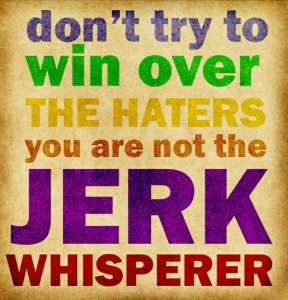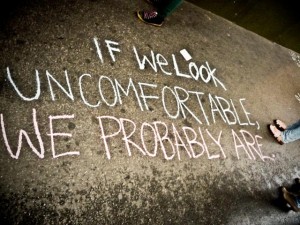The first time I heard of Biola, I thought it was an educational institute dedicated to biology. I was disappointed to find out that Biola is actually the oddly twee abbreviation for “Bible University of Los Angeles.”
Alrighty, then. Many fine (and not-so-fine) educational institutes have religious origins, even religious outlooks and messages. What can I do, really.
Then, I started seeing this billboard on my nigh-daily trek up the 55 North freeway.
The billboard was apparently part of a larger campaign to promote Biblical thinking about everything.
Think biblically. About everything. http://t.co/uj3bvXV69y #ThinkBiblically
— Biola University (@biolau) March 4, 2013
I suppose that because the re-tweets numbered fewer than a dozen and only one person re-shared the corresponding Facebook post, they realized they weren’t going viral and had to pay to get attention.
(The ever-awesome Elizabeth caught this.)
I’d imagine that they’ll elicit a snicker rather than incite Biblical thinking about everything by targeting ads to this site.
As I live relatively nearby, I contemplated a response to their marketing campaign. Showing up on campus with a posse of people each in a current state of violation of at least one Biblical principle — one person eating shrimp cocktail, another wearing mixed fibers, two people of the same gender kissing, a married woman whose husband declared that she hadn’t been a virgin on her wedding night, and so on — sounded kind of fun. The more I thought about it, though, the more I realized that calling out the absurdity of the Bible by violating its principles yourself is just so… played.
Instead, I’m going to think Biblically about everything. “Everything” includes Biola’s website, right?
Their faculty page reveals that they have have female instructors, ones who brazenly sport pearls and braids, no less! Unless those women teach women-only courses, they are in clear violation of the Bible.
Lest I rely too heavily on the misogyny of Paul, who is clearly a rather low-hanging fruit of a target, I turn to Leviticus, one of the favorite thump-worthy section of the Old Testament. Shockingly, according to their president, Biola isn’t in favor of putting their gay male students to death.
I wanted to continue with Leviticus by bringing up Biola’s explicit condoning of shellfish, but then I found a piece written about that very topic on their site.
Christians ought to look for the principles behind the different Old Testament laws to discern what they say about God’s unchanging holiness, he said. An essential part of this is to understand what the rest of the Bible teaches, especially in the New Testament, he said. Homosexual behavior, for instance, is clearly shown throughout the rest of Scripture to be inconsistent with God’s will – whether in Genesis or in Paul’s letters, Saucy said. “You find it as a running theme throughout the Bible,” he said. “If you didn’t have it anywhere else, and you didn’t have strong implications from creation, and all you had was Leviticus, then it would be a more difficult question.”
Am I to believe, then, that when they say “Think Biblically about everything,” what they mean is “Use your personal judgment to figure out what in the Bible is worth paying attention to and what is worth utterly ignoring”?
Sounds suspiciously like something a lot of us are accused of engaging in, that term thrown out by Bible-lovers worldwide as if it were a slur rather than a descriptor: moral relativity.
The horror.
See the alleged trump card Biola advocates using against “New Atheists.”
What makes your moral standard more than a subjective opinion or personal preference? What makes it truly binding or obligatory? Why can’t I just ignore it?
Right back atcha, Biola.
























